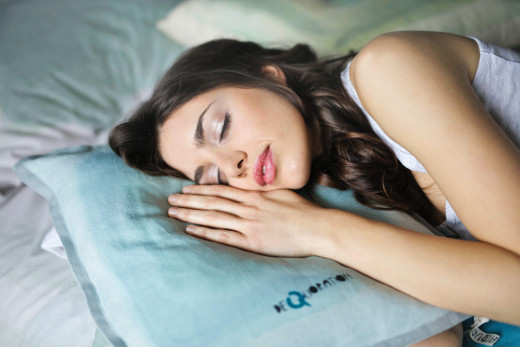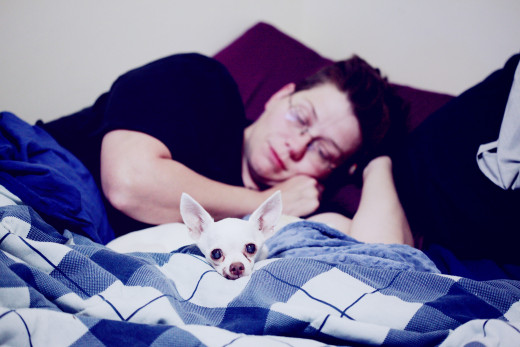Why You Should Sleep More


Why You Should Sleep More.
Sleep is a naturally occurring state of mind and body,which typically recurs for several hours every night, in which the nervous system is inactive, the eyes closed, the postural muscles relaxed, and consciousness practically suspended. Sleeping is essential for a healthy living, just as important as other life sustaining activities like eating, drinking and breathing. There have been lots of researches on why we sleep, though scientists do not have clear answers yet, the research has not been a waste of time. We have more insight about the functions of sleep today. Some of the functions of sleep generally accepted by scientists are :
- Brain functionality. During sleep, the nerve cells reorganize, the brain glymphatic system which is responsible for waste clearance removes waste from the central nervous system and rids the brain of toxic by product which accumulates during the day. This enables your brain to perform optimally when you wake up. Sleep has a direct effect on brain functions such as; learning, concentration, focus, memory, creativity, decision making.
- Energy conservation and body repairs. Sleep helps the body to conserve energy and repair itself. It provides an opportunity for the body to 'restore' what it lost while we are awake. Findings of scientists have shown that many major restorative activities in the body like muscle growth, release of growth hormones,tissue repairs, protein synthesis happen mostly or in some cases only when we sleep.
- Immunity. Sleep to a large extent determines our body immune system. When we sleep, the body produces proteins and certain antibodies which help to fight infections, destroy germs and prevent us from falling sick. This is why when we fall sick, we need to sleep more
- Emotional health. When we sleep, brain activities in the areas that regulate emotions increase. This increase in activities improves proper brain function and emotional stability. This explains why people who sleep well are more likely to deal better with stressful situations than people who don't get enough sleep. The latter are more likely to overreact.
How Much Sleep Is Enough?
We often mistake the amount of sleep we can get by with as the amount of sleep required to function properly.
While you may be able to get by with six to seven hours of sleep ( some get by with four to five), it doesn't mean you're getting enough sleep.While adults need seven to nine hours of sleep per night, one-year-olds need roughly eleven to fourteen hours, school age children and teenagers between eight to eleven. During these critical periods of growth and learning, younger people need to sleep more for proper development.
Sleep deprivation.
Sleep deprivation occurs when an individual gets less than the required amount of sleep that they need to feel awake and alert. When you fail to get your required amount of sleep, you start accumulating a sleep debt. A debt which would cost your body dearly if nothing is done about it.
According to a study by the Centers for Disease Control and Preventions (CDC), 1 in 3 Americans do not get enough sleep. Another study by Scientific American shows that 20% of teenagers get less than 5 hours sleep while the average is 6.5 hours.
Sleep deprivation can be compared to alcohol intoxication. You wouldn't want to go about your daily routine intoxicated, would you? That would be dangerous. It's just as dangerous to go about our lives sleep deprived.
What are the signs you're not getting enough sleep?
You're not getting enough sleep if :
- You sleep less than eight hours at night.
- You need an alarm to wake you up on time.
- You find it difficult to get out of bed when you wake up in the morning.
- Feel drowsy when driving.
- Feel sluggish during the day.
- You constantly dose off or feel like sleeping in meetings, lectures or at work.
- Fall asleep while watching TV.
- You need naps to get through the day.
Some of the risks associated with sleep deprivation are:
- Increased risk for medical conditions such as heart disease, stroke, diabetes, high blood pressure, dementia, obesity. Research has shown that sleeping less than 5 hours at night increases the risk of obesity by 50%, risk of developing a heart disease by 48%, risk of dementia by 33%. Also not having enough sleep is considered a significant risk factor in the development of type 2 diabetes.
- Depression and Anxiety. We usually feel irritated when we do not have a good night sleep. Sleep deprivation in the long term has been linked with depression. Most people who suffer from depression do not sleep long enough at night. Anxiety is also common among people with sleep deficiency. They are less tolerant to even mild daily stressors.
- Brain malfunction. It's usually very difficult to concentrate after one unrestful night. We often experience mental fatigue, quick temper and poor focus. Sleep is not only necessary for people to be alert, focus and learn, it also affects our problem solving skills, the ability to control our emotions and reflexes. When the brain does not get enough rest over a long period of time, mental faculties deteriorate drastically. Sleep deprivation is not only capable of making the brain malfunction, it can also age the brain by 3 - 5 years. Each year, 6000 fatal car accidents are caused by drowsy driving.
- Decreased sex drive. No way!! Sorry but this is for real. Lack of sleep could kill libido.Low levels of testosterone can lead to a lack of sexual desire and erectile dysfunction.It turns out that the highest production of this important hormone occur during REM sleep, which is the deep, healing sleep that occurs late in the sleep cycle. Your first REM will last about 10 minutes, but as the night goes on REM stages grow longer, with the final one lasting up to an hour. So, if you don’t sleep long enough to enter REM sleep, you don’t get those restorative levels of circulating testosterone.Women are particularly at risk.
- Premature skin aging. Inadequate sleep has been correlated with reduced skin health and accelerated skin aging. Sleep deprived women are vulnerable to premature skin aging and a decrease in their skin’s ability to recover after sun exposure. In a study commissioned by Estée Lauder, 60 pre-menopausal women between the ages of 30-49 had their skin visually examined and were required to be involved in a number of non-invasive sleep challenges. Of these 60 women, around 50% suffered from poor sleep. It was found that this group, especially, exhibited noticeable signs of premature ageing when compared to their better-rested counterparts, with fine lines and uneven skin pigmentation being particularly visible.
Sleeping better.
We would be doing our mental and physical health a huge favour if we begin ( or continue ) to sleep well. Failure to do so and we know too well by now how costly it could be for us. Here are few tips that could help you sleep better.
Keep a regular sleep-wake schedule. As much as possible, make sure that your bedtime and wake up time is the same everyday. This helps set your body's clock system and makes you feel more refreshed, energised and alert than when you sleep the same number of hours at different times.
- Avoid late night television. Light from television suppresses melatonin which is a naturally occurring hormone controlled by light exposure that helps regulate your sleep-wake cycle. Your brain secretes more melatonin when it’s dark making you sleepy and less when it’s light making you more alert. Tv programs also get us excited rather than relax us. You should listen to music instead.
- Sleep in a dark room. Don't just switch off the lights alone, make sure the curtains and shade is drawn to prevent light from entering through the window, cover all electronics that emit light. If you get up in the night and you need light to move around, instead of switching on the lights, try using a flashlight instead, this would make it easier for you to fall back asleep.
- Exercise regularly. People who exercise regularly find it easier to sleep at night. Light exercise such as walking for a few minutes can improve the quality of your sleep. It may take several months of regular activity before you experience the full sleep-promoting effects nevertheless consistency is the key. Moderate to vigorous workouts should be done at least three hours before bedtime. If you’re still having difficulties falling asleep, workouts should be moved even earlier.
- Eat and drink smart. Substances that contain caffeine and nicotine should be avoided as they can cause sleep problem. Eat dinner as early as possible, heavy food should be avoided at night. Drinking too many liquids in the evening may result in frequent trips to the bathroom all through the night.
- Sleep in a conducive environment.The quality of your environment can hugely influence the quality of sleep you get. Sleep in a quiet environment. If you can't keep the noise down, you may use earplugs. Make sure your bedroom is well ventilated and slightly cool (65°F or18°C) . Sleep in a comfortable bed. If your back feels sore or your neck aches when you wake up, then you aren't sleeping comfortably.
Earplugs

This content is accurate and true to the best of the author’s knowledge and is not meant to substitute for formal and individualized advice from a qualified professional.








